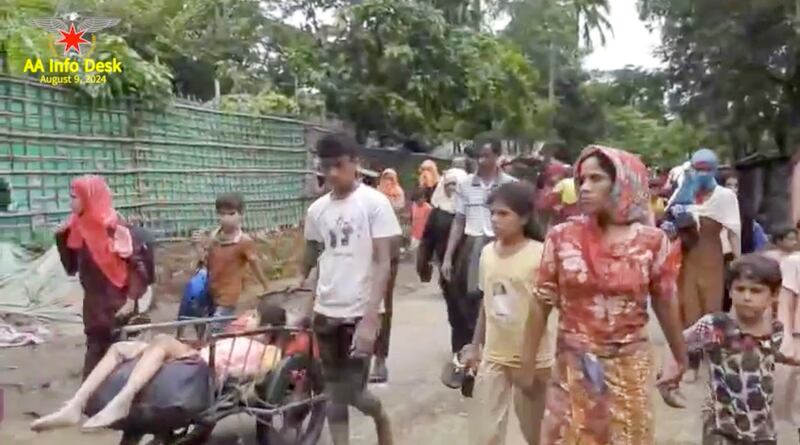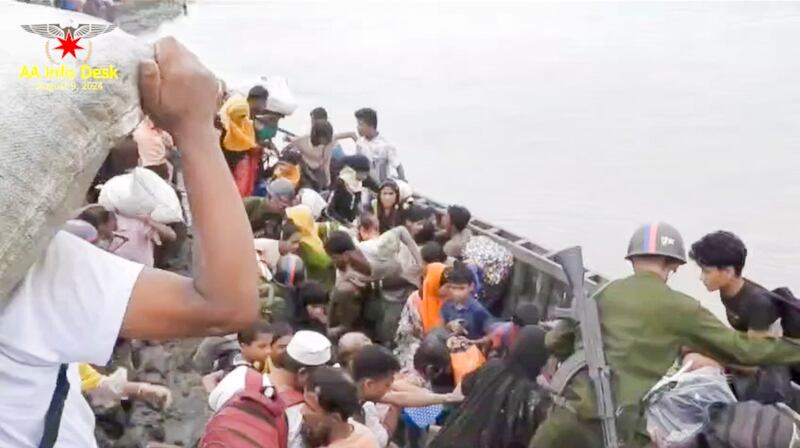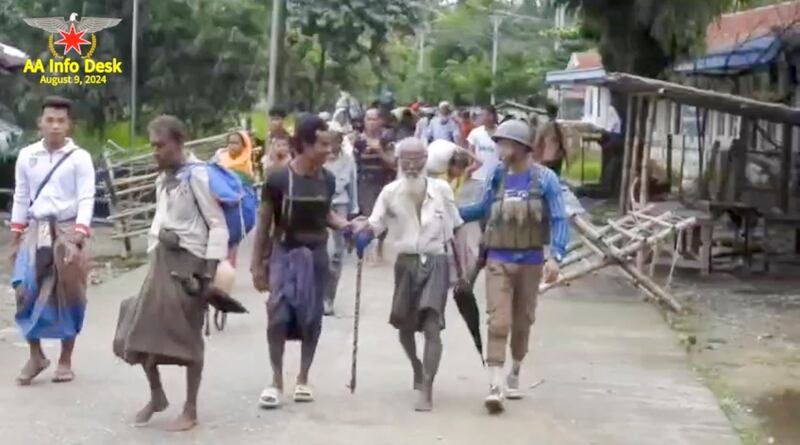Updated Aug. 12 at 4:23 p.m. ET.
More than 13,000 Rohingya Muslims and hundreds of other inhabitants of western Myanmar’s Maungdaw township have fled their homes in recent days amid intensifying conflict between the military and ethnic rebels in Rakhine state, residents said Monday.
The rebel Arakan Army, or AA, is fighting for control of Maungdaw – the latest push in its goal to take over Rakhine state and part of a wider civil conflict that has consumed much of Myanmar since a 2021 military coup.
The AA has evacuated more than 15,000 people – including over 13,000 Rohingyas and hundreds of ethnic Rakhines and Hindus – from Maungdaw since Aug. 7, when it seized two-thirds control of the township seat, said a resident who, like others interviewed for this report, spoke on condition of anonymity due to security concerns.

The newly displaced Rohingyas join some 6,500 who have fled to neighboring Bangladesh or were waiting to cross border via the Naf River since the start of last week, the resident said, adding that around 5,000 others have been unable to leave the township.
"[As many as] 20,000 Rohingyas have been evacuated so far,” he told RFA Burmese on Monday. “Most of the downtown areas are under the control of the AA ... Some Muslims are trapped in areas controlled by the junta troops and in conflict zones."
RELATED STORIES
[ Opponents of Myanmar junta skeptical on any Thai help for census, voteOpens in new window ]
[ Some 5,000 Rohingya who fled recent fighting waiting to cross to BangladeshOpens in new window ]
[ Weapons fire kills many Rohingya as they attempt to reach BangladeshOpens in new window ]
[ Violence against the Rohingya explainedOpens in new window ]
Other residents of Maungdaw said that most of the evacuated Rohingyas are staying in shelters provided by the AA, while others are preparing to leave for Bangladesh with their families.
About 1 million stateless Rohingya refugees live in tightly packed border camps in Bangladesh. Most fled there in 2017 to escape violent crackdowns in Rakhine state that were blamed on the Myanmar military.
But more Rohingya have been seeking refuge in Bangladesh lately as security has deteriorated in Rakhine state.
Last week, homemade rockets, artillery and drones were fired at Rohingya as they waited on a Myanmar riverbank for motorboats to carry them to Bangladesh, leaving dozens of people dead. Witnesses who spoke to RFA put the death toll as high as 200, although RFA was unable to verify those estimates.
Several Rohingya told RFA that the AA was responsible for the attack, but the rebel group denied in a statement that their troops fired the weapons.
Providing aid
A volunteer assisting the Rohingya, identified as Mamud Saulain, told RFA that the AA needs to assume responsibility for the well-being of the ethnic community.
"It is crucial to provide them with food and shelter,” he said. “Security measures should be in place to protect them from [military] airstrikes, attacks from naval bases, and heavy weapons fire."

Saulain also called on armed groups to allow those trapped in Maungdaw to leave for safer areas.
Veteran Rakhine politician Pe Than said the welfare of civilians in the area is “of the utmost concern.”
“They will be taken to liberated areas that include many Muslim and Rakhine villages,” he said. “They [Rakhine authorities] are prepared to provide them with humanitarian assistance.”
AA spokesperson Khaing Thu Kha, told RFA that the displaced had been “sent to safer places.”
"The junta forces are not allowing Maungdaw residents to leave the town while the fighting intensifies” he said. “The AA has rescued as many civilians as possible. They have now been sent to safer places, and we are providing them with food, accommodation, and healthcare services as well."

Khaing Thu Kha said the AA had rescued people who were "being used as human shields [by the military] to protect Maungdaw township."
Attempts by RFA to contact Attorney General Hla Thein, the junta’s spokesperson for Rakhine state, about the situation in Maungdaw went unanswered Monday.
Translated by Aung Naing. Edited by Joshua Lipes and Malcolm Foster.
This story has been updated to include reports of an Aug. 5 attack on Rohingya on a riverbank.
